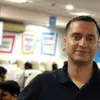Meet Chester Santos, the ‘International Man of Memory’ who quit Silicon Valley to coach others
US Memory Championship 2008 winner Chester Santos’ friends and family thought he was “crazy” when he decided to quit his job as a Silicon Valley software engineer. In a conversation with YourStory, we discover his roots, journey, and more.
‘International Man of Memory’ Chester Santos is a memory coach to celebrities, politicians, athletes, and high-powered executives.
Chester calls himself ‘almost half an Indian’. His biological father’s family was originally from India before migrating to Trinidad.
His mother, of Puerto Rican origin, was born and raised in Brooklyn, New York. “I had a couple of stepdads and the one who raised me, his last name is Santos, which I took,” he tells YourStory.
However, Chester had never been to India until now when he visited Mumbai for the World AI Show. The UC Berkeley alumnus quit his cushy software engineer job in 2008, at a time when the global economy took a hit. He had just won the US Memory Championship and decided to chart his own journey.
“When I started out, everybody thought I was crazy. They said, ‘how can you get into a random thing nobody has ever heard of?’ and I was discouraged,” says Chester.
Today, things are different. He has a memory school, which is a subscription service and he also provides private coaching ‘to a limited degree’. With two books already to his name - “Instant Memory Training for Success”, which became a bestseller in WHSmith stores across the UK, and “Mastering Memory: Techniques to Turn Your Brain from a Sieve to a Sponge”, Chester has certainly come a long way.
YourStory caught up with the memory coach to talk about his entrepreneurial journey, his work with celebrities, and how startups ecosystem can benefit from his skills.

Chester Santos, the 'International Man of Memory'
Edited excerpts below:
YourStory: What brings you to India?
Chester Santos: I was here for the World AI (Artificial Intelligence) Show with a bunch of executives and founders from various companies that deal with AI. I was the speaker with a whole different angle, with an entertainment factor as well.
I wanted to impress upon the audience that with all that is happening in AI and all the advancement in technology, we need to be aware that it all came from the human brain. It is important that in the age of technology we don’t ignore our brains.
Our brain has amazing abilities and my area is the memory, which is fundamental to learning. A good memory can have a positive impact on both your professional and personal life.
YS: What do you think about India?
CS: Everybody is super friendly and the food is really good. I have always liked eating Indian food back in the US. It’s exciting seeing new things and being in a new environment. It was challenging in terms of the Indian names though.
I have given presentations in more than 30 countries, but the Indian names are unique for me. I still made only two mistakes while remembering the names of 40 people I met at the conference.
YS: What impact does digital dependency have on our memory?
CS: I think in today’s society, the digital dependency we have is dangerous. Let's take phone numbers, for example. We used to be able to remember phone numbers of friends and relatives.
But nowadays, you give someone one phone number to remember and they feel paralysed. Some don’t even know their own number.
Another example is navigation. New York City and London taxi drivers were both, at one time, famous for their navigation skills and could remember thousands of streets.
Today, when I get into a taxi in San Francisco, where I live, if the cell network is slow or there is something wrong with the navigation app, they can’t even get you to the Civic Center of Downtown.
Uber and Lyft are making it worse. A few times, when there’s something wrong with the app or the cell connection, the drivers have to restart their phones a few times, even if they have been driving over five years in that city.
This is because they are 100 percent reliant on tech. I think it’s a clear example of what happens when you completely turn off your brain. We need to be careful to not let our brains wither away.
YS: How can startups and executives benefit from your expertise?
CS: A lot of people attend conferences to network, but you are not really getting the most out of networking if you have no idea what their name is or what their company does the next time you see them. On the other hand, if you do remember, it helps strengthen relations and you can get a lot more business-wise.
When you are meeting potential clients or investors and you have a real command over your memory, you are already more impressive. They will know that you really know your stuff, you’re sharp and that really makes you stand out and you are perceived as an expert.
YS: Who are your celebrity clients and what kind of work do you do with them?
CS: It depends on what I am allowed to say. One really interesting and cool project this year has been with former British heavyweight boxer David Haye. After retiring from boxing, he was trying to become a professional poker player and was having memory issues in preparing for the poker championship in the UK. He thought it could have to do with blows he has taken during his boxing career.
Then there has been the three-time Grammy award nominee DJ Paul Oakenfold. A really wealthy businessman in Mexico hired me to do a private workshop at his home. And Paul was there and I got to train him.
I have also worked with the famous jockey Aaron Gryder, who is one of the top-earning horse racing jockeys in the world.
I don’t want to mention the politicians. I have also worked with a lot of executives and professional athletes. A lot of people see the value in being able to remember things.
YS: When did you realise your memory is better than others?
CS: How it all started is so random. This was way back in 2000. I was flipping channels and came across this show called 20/20 on ABC. It was a really popular evening news show in the US, which happened to have a segment on the US Memory Championship.
I had not even heard about it (the championship) until that point. I told myself that maybe I can do this. As I was growing up I often got the comment from people that “Wow! You have a really good memory.”
I could memorise a deck of cards in minutes, and remember hundreds of names and numbers. I was definitely above average but nowhere close to the people in the competition. That’s when I started doing research on how to improve memory.
I experimented with a lot of things until I found what works best for me and I managed to win the US Memory Championship in 2008. And over the last 11 years, I have spent training people all over the world.
YS: You had not always planned this as a career, right?
CS: I had heard about people who did this sort of thing. Talking at conferences about personal development topics and communication skills, and things like that. It wasn’t always the plan.
Originally, I was majoring in psychology from UC Berkeley as a pre-law. After graduating, the first year I worked at a law firm and then I went to law school. But I hated law school; it was not for me at all. I dropped out after one-and-a-half years and, instead, got a master's in Software Engineering.
Then, I worked at Sun Microsystems before it got bought by Oracle and, later, I worked with Wells Fargo on investment applications. Then, in 2008, I quit my job and began doing this full time.

Chester's friends and family thought he was "crazy" when he quit Silicon Valley to become a memory coach
YS: What did people think about your decision to become a memory coach?
CS: Everybody thought I was crazy. I was really discouraged by family and friends. They all couldn’t believe that a software engineer would leave his Silicon Valley job to do this.
YS: Tell us about your journey so far and the road ahead.
CS: The first two-three years were really difficult and I was struggling to make money. But as cliched as it may sound, what really kept me going was having confidence in myself and belief in my vision.
I want to continue what I am doing. It is what I love. I might write my third book by 2021, which will be geared towards parents helping their kids in school.
(Edited by Saheli Sen Gupta)










